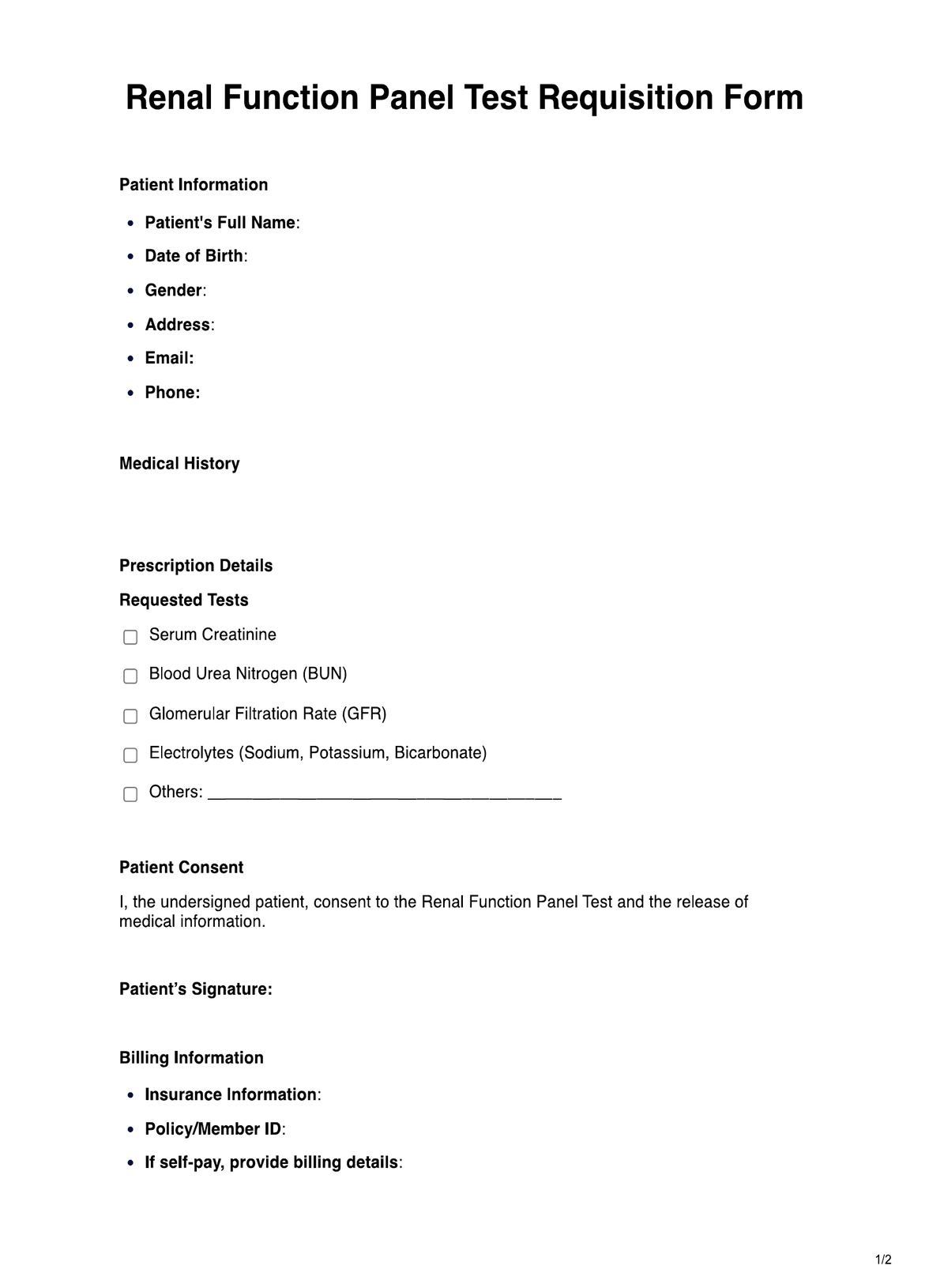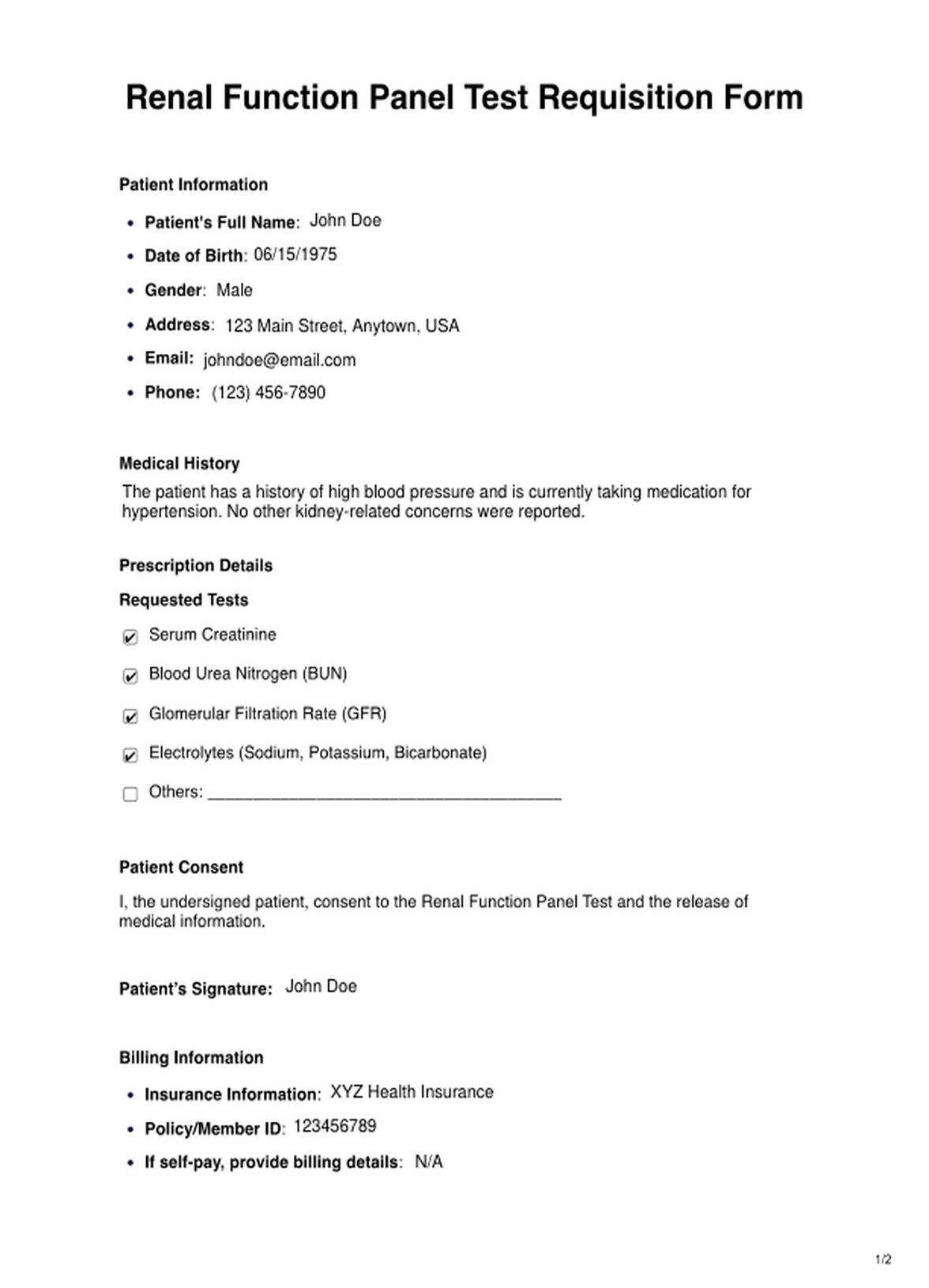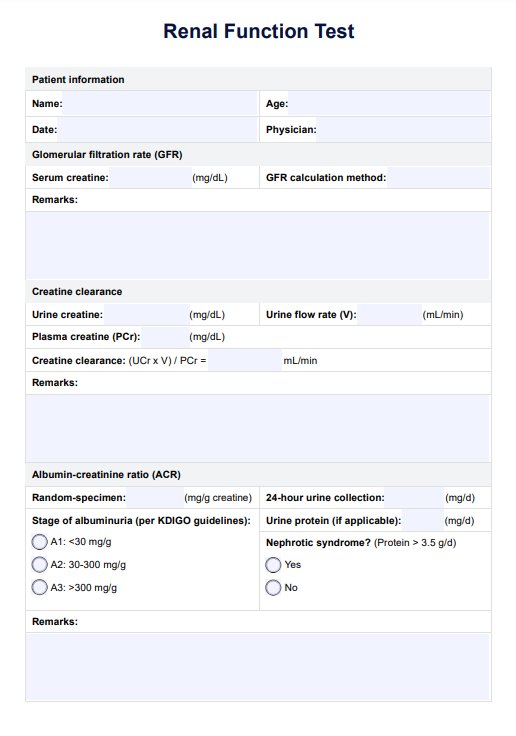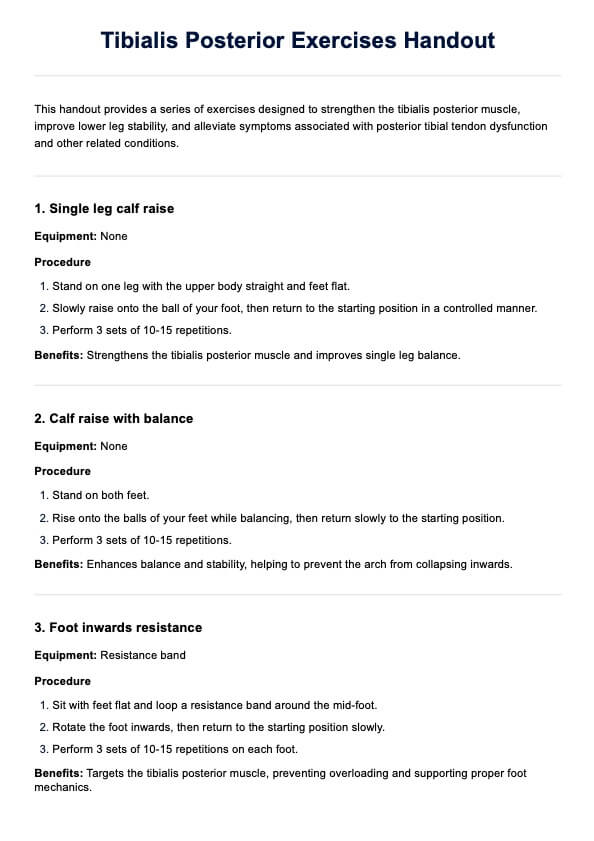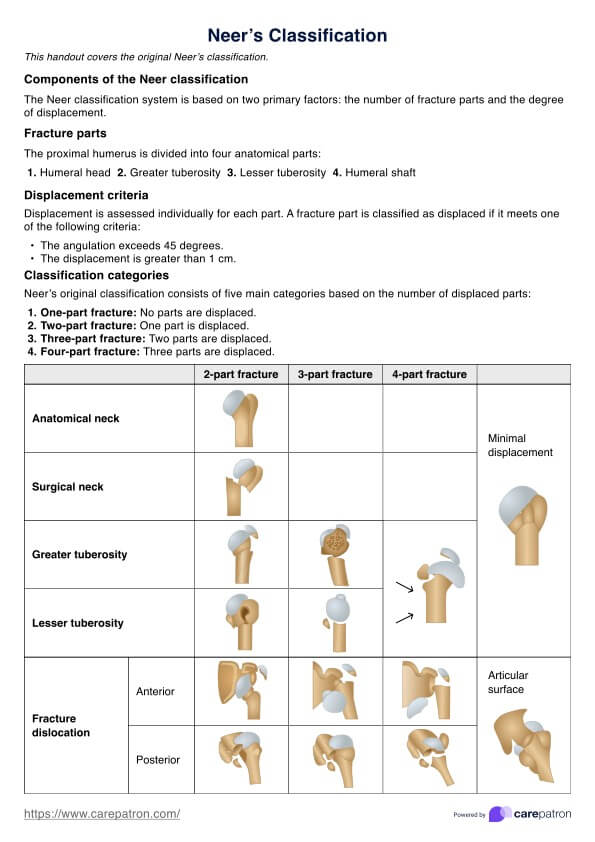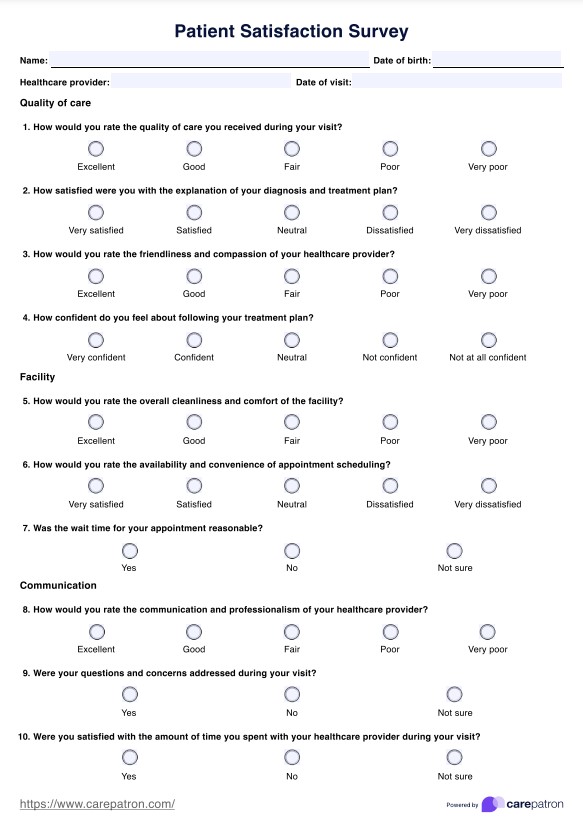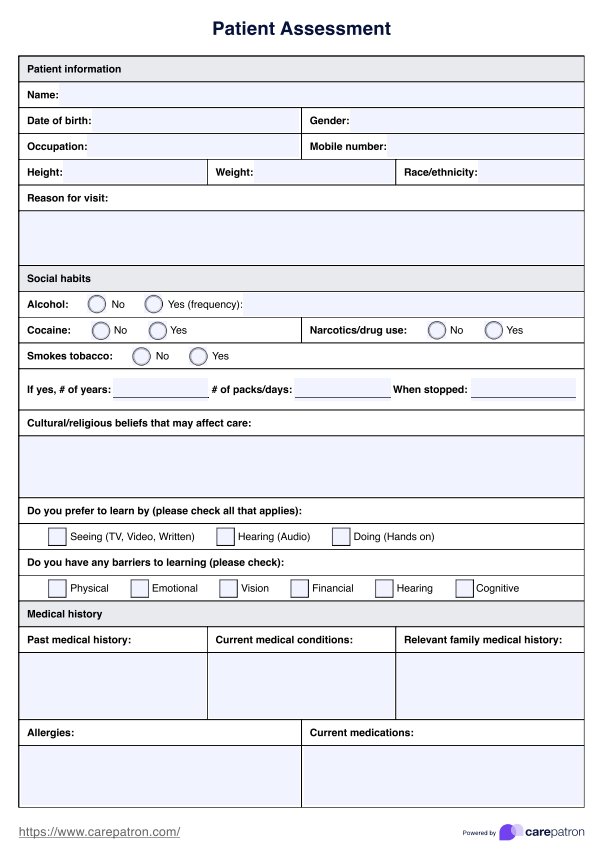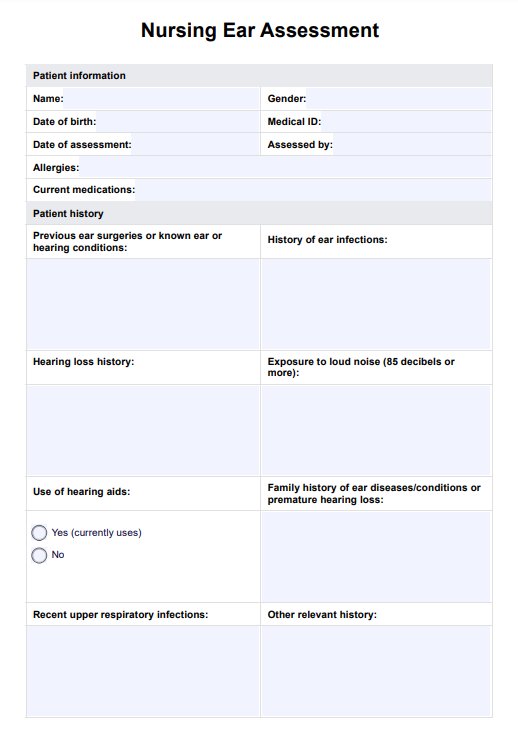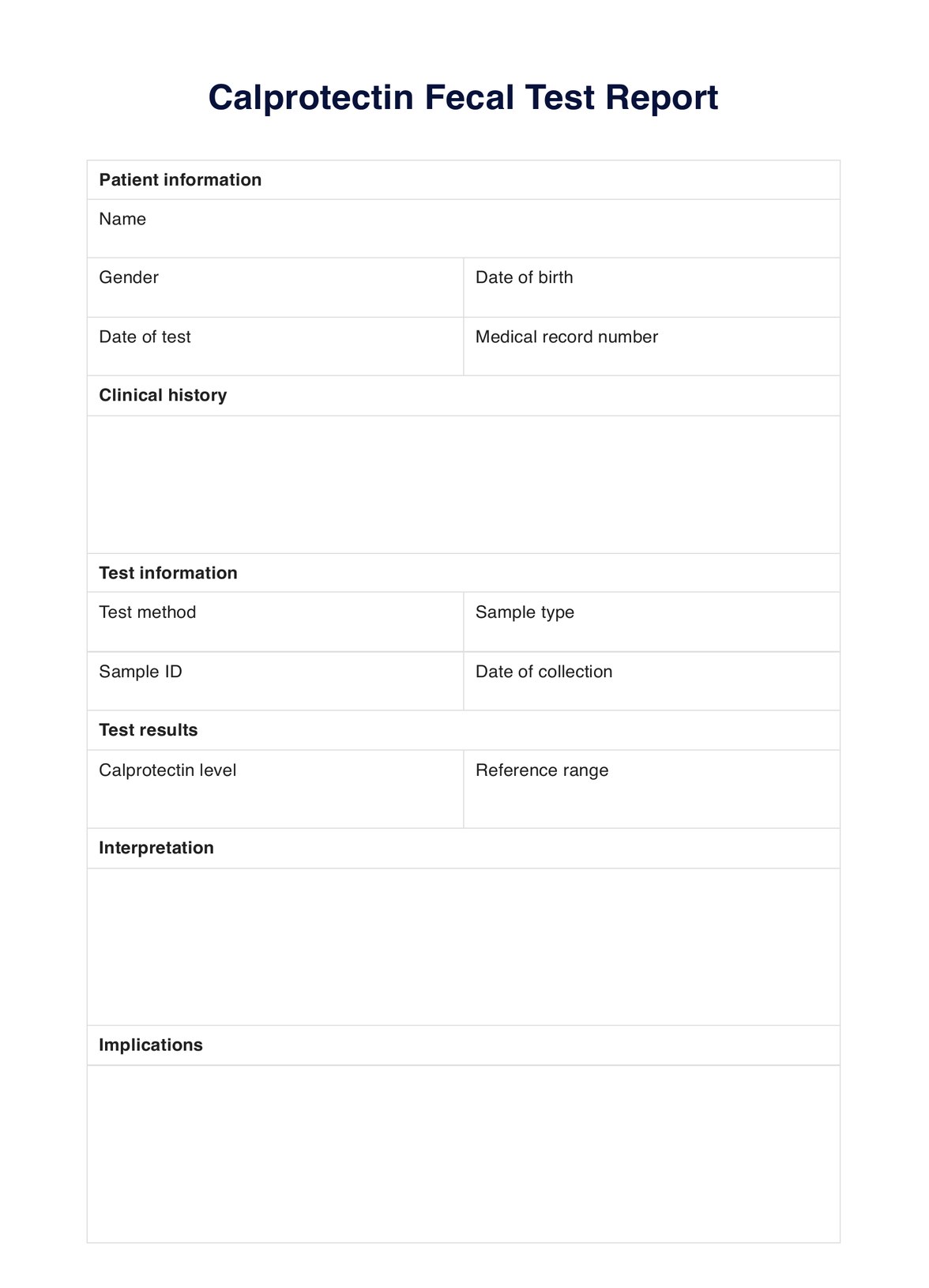Renal Function Panel
Comprehensive Renal Function Panel Test - Assess kidney health with expert insights. Make informed healthcare decisions.


What Is a Renal Function Panel Test?
A Renal Function Panel, also known as a kidney function panel or renal panel, is a group of blood tests designed to assess the overall health and function of the kidneys.
The kidneys are vital organs responsible for filtering waste products and excess substances from the blood, regulating fluid and electrolyte balance, and producing hormones that help control blood pressure and red blood cell production. Therefore, a Renal Function Panel is crucial for evaluating the performance of these essential organs.
The panel typically includes several key tests:
- Serum Creatinine: This test measures the level of creatinine in the blood, a waste product produced by muscle metabolism. Elevated creatinine levels can indicate impaired kidney function.
- Blood Urea Nitrogen (BUN): Blood Urea Nitrogen (BUN) measures the amount of nitrogen in the blood from urea, a waste product produced when the body breaks down proteins. High BUN levels may suggest kidney dysfunction.
- Glomerular Filtration Rate (GFR): GFR is calculated based on the creatinine level and other factors. It estimates how well the kidneys are filtering waste from the blood.
- Electrolytes: This part of the panel assesses the levels of electrolytes like sodium, potassium, and bicarbonate in the blood, as kidney function affects their regulation.
- Blood Pressure: Blood pressure measurement is crucial since kidney health is closely linked to blood pressure regulation.
A Renal Function Panel is typically used to diagnose or monitor kidney diseases, such as chronic kidney disease, acute kidney injury, or electrolyte imbalances. It can also be employed to assess the impact of certain medications on the kidneys. Results from these tests help healthcare professionals identify kidney problems and tailor treatment plans accordingly. Patients with risk factors for kidney disease, including diabetes, high blood pressure, or a family history of kidney issues, may undergo regular Renal Function Panel tests to ensure their kidneys function optimally. It's an essential tool in maintaining kidney health and preventing potential complications.
Renal Function Panel Template
Renal Function Panel Example
How Does it Work?
Consultation
Initiate the process by consulting a healthcare provider to assess your medical history, symptoms, and risk factors for kidney-related issues. They will determine the necessity of a Renal Function Panel test.
Prescription
If deemed necessary, your healthcare provider will issue a prescription specifying the required tests, including the Renal Function Panel.
Lab Visit
Take the prescription to a medical laboratory or diagnostic center that offers the Renal Function Panel test. You can often find a printable Renal Function Panel requisition form online or provide by your healthcare provider.
Steps for Filling the Form
- Personal Information: Write your name, birthdate, gender, and contact details.
- Insurance Details: Share insurance info if you have it.
- Medical History: Briefly describe your medical past, especially kidney-related issues.
- Prescription Details: List the tests your provider ordered.
- Patient Consent: Sign the form to agree to the test and sharing of medical data.
- Billing Information: If you'll pay for any costs, fill in the billing details accurately.
Sample Collection
A trained healthcare professional will collect a blood sample from your arm, usually using a needle and blood collection tube. This blood sample is necessary for the Renal Function Panel tests.
Laboratory Analysis
The collected blood sample is sent to the laboratory for analysis. Skilled technicians will conduct a series of tests in the Renal Function Panel, such as measuring creatinine levels, blood urea nitrogen (BUN), and electrolytes.
Result Reporting
Once the laboratory analysis is complete, the results are generated and reported to your healthcare provider.
Review and Interpretation
Your healthcare provider will review and interpret the results with you. They will explain the findings and offer guidance on your kidney health, any potential concerns, and recommended next steps or treatments if necessary.
When Would You Use This Test?
The Renal Function Panel Test is used in various medical scenarios to assess kidney function and diagnose kidney-related conditions. Here's a focused look at when this test is appropriately employed:
- Routine Health Check-ups: Primary care physicians often use the Renal Function Panel Test in routine health check-ups, especially for individuals with risk factors like diabetes, hypertension, or a family history of kidney disease. It's essential for early detection and ongoing monitoring of kidney health.
- Kidney Disease Monitoring: Nephrologists specializing in kidney health rely on this test to diagnose and manage chronic kidney disease, acute kidney injury, and glomerulonephritis. It helps assess the severity of kidney damage and guides treatment decisions.
- Cardiovascular Health: Cardiologists may order the Renal Function Panel Test to assess kidney function in patients with heart disease. Kidney health is closely linked to cardiovascular well-being, and this test provides insights into the overall cardiovascular risk profile.
- Endocrine Disorders: Endocrinologists use this test for patients with hormonal disorders such as diabetes and thyroid issues. It helps evaluate kidney function in the context of endocrine disorders and guides treatment adjustments.
- Emergency Medicine: In emergencies, emergency medicine physicians may employ this test to diagnose acute kidney injury in patients with trauma, severe infections, or drug-related kidney damage.
- Urological Evaluations: Urologists may request the Renal Function Panel Test to assess kidney health in urinary tract issues, kidney stones, and other urological conditions.
- Oncology: Oncologists use the test to monitor kidney function in cancer patients undergoing treatments that can affect the kidneys, helping to manage potential side effects and optimize treatment plans.
- Transplant Assessments: Transplant surgeons use the Renal Function Panel Test to evaluate the suitability of a donor's kidney and assess the recipient's existing kidney function before kidney transplant surgeries.
What do the Results Mean?
The results of a Renal Function Panel Test provide valuable insights into the overall health and functioning of the kidneys. This panel typically includes several key parameters, and here's what common results can indicate:
- Serum Creatinine: Creatinine is a waste product of muscle metabolism and excreted by the kidneys. Elevated creatinine levels may suggest impaired kidney function, a sign of acute or chronic kidney disease. The degree of elevation can provide information about the severity of the issue.
- Blood Urea Nitrogen (BUN): BUN measures the amount of nitrogen in the blood that comes from the breakdown of proteins. High BUN levels can indicate reduced kidney function or dehydration. Low BUN levels may be seen in liver disease or malnutrition.
- Glomerular Filtration Rate (GFR): GFR estimates how efficiently the kidneys filter waste from the blood. A lower GFR often suggests reduced kidney function. The stages of chronic kidney disease are categorized based on GFR levels, with higher stages indicating more severe impairment.
- Electrolytes (Sodium, Potassium, Bicarbonate): Electrolyte levels play a crucial role in kidney health. Abnormalities can indicate kidney problems, dehydration, or electrolyte imbalances. High or low sodium and potassium levels may require immediate attention.
Understanding Renal Function Panel Test results is vital for diagnosing and managing kidney-related conditions. It's important to note that interpreting these results should be done by a healthcare provider, as they consider the individual's medical history, symptoms, and other relevant factors.
Research & Evidence
The Renal Function Panel, known as the kidney function panel, was developed in response to the growing need for a standardized and efficient approach to evaluating kidney function (Healthdirect Australia). In the mid-20th century, nephrologists and laboratory scientists recognized the significance of comprehensive testing for assessing kidney health.
Standardization of the Renal Function Panel Test became crucial as clinical laboratories acknowledged the importance of simultaneously assessing multiple kidney function parameters (Stang, 2018). This standardization has proven invaluable in providing a holistic view of kidney health and enhancing the accuracy of assessments.
Extensive research and clinical studies have firmly established the clinical utility of the Renal Function Panel Test (American Kidney Fund, 2023). It has been instrumental in diagnosing kidney diseases, monitoring disease progression, and evaluating the effectiveness of various treatments. Furthermore, it plays a pivotal role in the field of nephrology.
The Renal Function Panel is widely employed for diagnosing chronic kidney disease, acute kidney injury, and electrolyte imbalances, distinguishing between different types and stages of kidney diseases. Nephrologists rely on this test to monitor the effectiveness of treatments like dialysis and kidney transplantation, guiding treatment adjustments to improve patient outcomes.
Continual research efforts are ongoing to refine our understanding of kidney function and the Renal Function Panel Test. It aims to enhance its accuracy and relevance in clinical practice, ensuring better patient care.
References
American Kidney Fund. (2023, October 27). Tests for kidney disease. https://www.kidneyfund.org/all-about-kidneys/tests-kidney-disease
Healthdirect Australia. (n.d.). Kidney function blood tests. https://www.healthdirect.gov.au/kidney-function-tests
Stang, D. (2018, September 17). Kidney function tests. Healthline. https://www.healthline.com/health/kidney-function-tests
Commonly asked questions
Healthcare providers, such as primary care physicians, nephrologists, and specialists, typically request Renal Function Panel Tests for patients.
Renal Function Panel Tests assess kidney function and diagnose kidney-related conditions. They are employed in routine check-ups, diagnosing kidney diseases, monitoring treatments, and emergencies.
A healthcare provider prescribes the test, and a patient provides a blood sample. The sample is sent to a laboratory for analysis. The healthcare provider then reviews the results to assess kidney health.
The actual test involves blood sample collection, which typically takes just a few minutes. However, the turnaround time for results can vary but usually ranges from a few hours to a few days, depending on the laboratory's workload.


